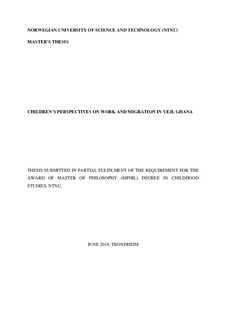Children's perspectives on work and migration in Yeji, Ghana
Master thesis
Permanent lenke
http://hdl.handle.net/11250/2565742Utgivelsesdato
2018Metadata
Vis full innførselSamlinger
Sammendrag
The study explored children’s perspectives on work and migration. The aim of the research was to explore the similarities and differences between children, caregivers and NGOs narrative of migration, fosterage and work and bringing to the fore families/community and NGOs perspectives on the implication of children’s work to their wellbeing. Methodology employed for the study included interviews, observation, ranking exercise, recalling, focus group discussion and drawings. Also, the study made use of ethical strategies such as privacy, confidentiality, protection, power balance and respecting cultures.
The study made some findings that most children view work as part of socialisation in the society, whilst others also see it as securing one’s future. Also, the main reason for migration leading to fosterage and work was poverty followed by high birth rate, divorce, single parenthood and the guest for greener pastures. Most of the children confirmed feelings of self-worth that comes with working since the society respect and appreciate a child who is hardworking. In addition, it revealed the contradicting viewpoints of NGOs on migration, work and fosterage. The study observed that there is a rift between the parents/community members and the NGOs in the area since the community members see the NGOs as interfering in their personal business.
It is evident from the study that some children are actively involved in the fishing work and majority of them are school dropouts whilst some are combining both. The cost of enrolling the children into schools involves pertinent cost which makes it difficult for the parents or guardians to afford hence forcing the children to help-out with the family business. In summary, children’s work is very important to their wellbeing thus help prepare them for the future. However, they should be protected, and the law should at least make basic education free for all children to attend school, so they can have basic education in addition to the work they do. Children voices must be listened to in order to make policies pertaining to children lives and wellbeing.
